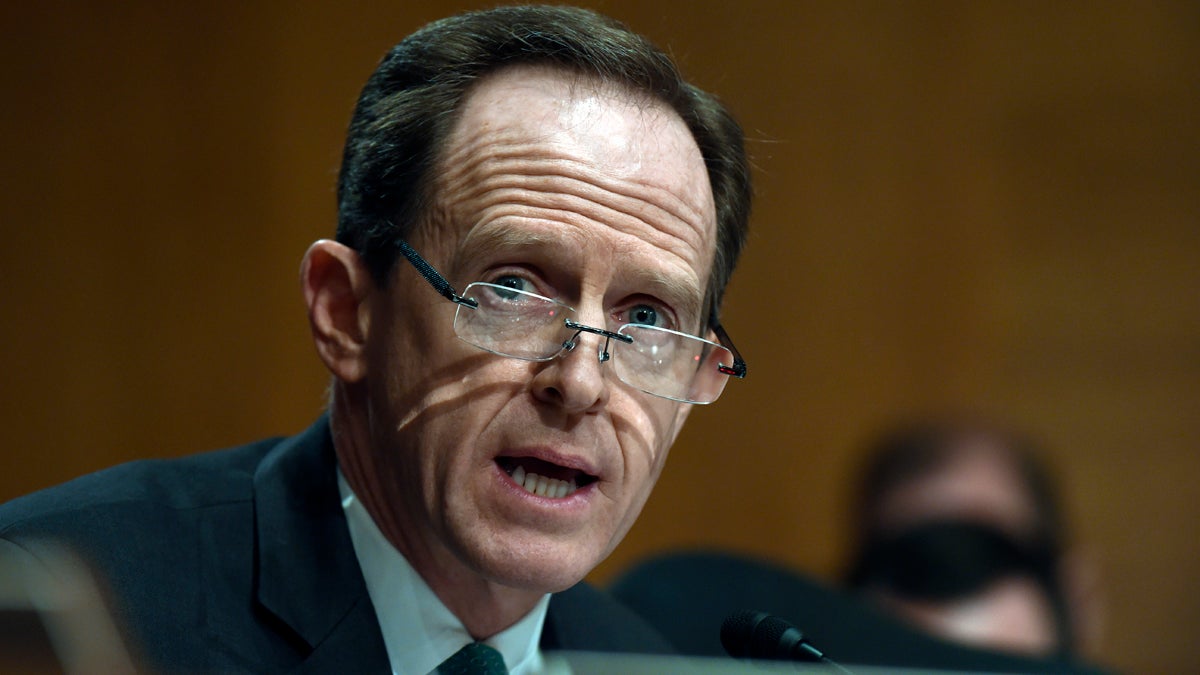In D.C., budget clashes worse than usual
Listen
Senate Banking Committee member Sen. Pat Toomey
Every year in Washington, the White House and lawmakers in Congress do a strange dance.
Feel free to think of it as the budget tango; like all things policy oriented, it’s not sexy. But there are precisely choreographed movements, with the White House always taking the lead.
This year, Republicans decided to sit out the traditional dance. What’s more, GOP leaders upended decades of congressional protocol and refused to even invite Obama administration officials to the Capitol to discuss their budget numbers.
Sen. Pat Toomey, a Pennsylvania Republican on the Budget Committee, is fine with the move.
“It’s certainly not a serious document, and, in past years when we’ve put it to a vote, every Democrat has voted against it — how serious could it possibly be?” Toomey said.
Toomey, who is facing tough re-election prospects this year, said there’s no way Republicans like him were going to support the president’s $4.1 trillion budget.
“It’s huge spending increases, huge tax increases. That’s what he’s given us — a big part of what’s given us this really, really weak economy year after year,” Toomey said.
Sen. Chris Coons, R-Delaware, declared it a sad day in Washington when the GOP won’t even debate the White House over competing spending priorities.
“They can label it a political document, but it is the president’s budget, and a huge amount of work went into it,” said Coons. “I think at the very least it should be given a fair hearing because there are some compelling policy ideas in it.”
The GOP is facing its own internal party squabble over the budget. A small but powerful group of House Republicans is trying to slash the budget numbers already agreed to by congressional Republicans and the Democratic White House. The tea party-inspired House Freedom Caucus is dead set on slashing the current budget agreement by $30 billion — even though that could derail the GOP’s chances of even passing a budget this year.
Rep. Thomas MacArthur, R-Central Jersey, said it’s foolish for his party to go back on the spending levels agreed to last year.
“The ink’s not even dry on it, and my belief is it would be a mistake to crack that open. There’s a lot of competing pressures,” he said. “I know there’s a lot of pressure on the Budget Committee to try to reconcile all of them, but my personal belief is we ought to stick to our guns.”
Following the budget roadmap
Think of a budget as a roadmap. It lays out the broad spending caps, while lawmakers on the Appropriations Committee are actually in control of driving the car. Rep. Chaka Fattah, D-Philadelphia — who gets to help drive from his seat on the committee — said the GOP needs to figure out spending levels soon or else risk confusion at home.
“In Philadelphia, we provide about $300 million a year for our early childhood education. The mayor and the governor want to increase access to pre-K, the federal government can be a partner, but we need to get our bills done on time so that we can work with local officials on getting these things done,” Fattah said.
This year’s proposed budget has items that are easy for the public to care about. It calls for a focused effort to eradicate cancer, led by Vice President Biden.
It also seeks to double down on efforts to boost the renewable energy sector, as it would impose a new $10-per-barrel tax on oil. Republicans don’t like that last one, or many of the new initiatives. However, Rep. Pat Meehan, R-Delaware County, is looking for common ground.
“There’s things we can work on, not just on the margins but probably where we have shared aspirations for people who are trying to find a way forward,” Meehan said. “But, in the end, we have got to be able to do it so that we are paying attention to not just the right priorities but the long-term implications of the debt.”
Meehan pointed to one spot in particular where he thinks the two parties may be able to overcome election year morass — making college more affordable.
“Say, take a Pell Grant and not have it count against your income, so when you at the end of the year are trying to calculate where you are going to find the last $25 for a tuition payment, it might make a difference,” Meehan said.
This is an election year. While neither party is likely to check off many items on their competing wish lists, the competing budget priorities will provide lots of grist for the campaign trail.
WHYY is your source for fact-based, in-depth journalism and information. As a nonprofit organization, we rely on financial support from readers like you. Please give today.




